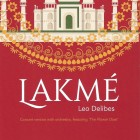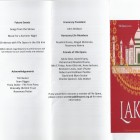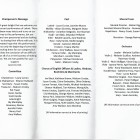Lakmé 2022Fife Opera
Read more about the opera Lakmé
Fife Opera, based in Kirkcaldy, and the most accomplished of Scotland's surviving amateur groups, have made a point over the years of reviving rare and unusual pieces to supplement the popular repertoire. They have in recent times tackled Nicolai's Merry Wives of Windsor, and both Il Tabarro and Suor Angelica by Puccini, as well as The Land of Smiles (Lehár) and Cendrllon (Massenet).
Fife Opera previously had a great success with Delibes' operatic masterpiece Lakmé in 1999, so it is very good to see them putting it on again. This work is set in India in the days of the Raj, featuring an ill-fated romance between a young British Army officer and an Indian priestess. Lakmé contains a wide variety of music, with two particularly popular hits being Lakmé's coloratura showpiece, the 'Bell Song', and the 'Flower Duet' for Lakmé and her maid Mallika (made famous a few years ago when used on a long-running series of British Airways commercials).
Far less well known is the music for the lovers - including an excellent duet which is repeated in various forms - and much attractive music for the high-flying lyrical tenor. There are also beautifully composed ensemble sections.
While the Adam Smith Theatre is closed for refurbishment, the company removed to a nearby concert hall, the 'Old Kirk'. This venue worked well on the whole, though there was some discreet amplification. The presentation was in pure concert form, the chorus at the back, the orchestra spread across the front, with soloists at front left. Alastair Digges' orchestra was a fair size, consisting of twenty-one players. There was a chorus of twenty-nine.
With the exception of the Lakmé, Gérald and Nilakantha, all the principals and soloists also sang in the chorus, emerging for their solo turns as required. This made for a full-bodied choral sound. in the important market scene and elsewhere.
Lakmé is an 'opéra-comique'. Like earlier serious models such as Bizet's Carmen and Offenbach's Tales of Hoffmann, the musical episodes are linked with spoken dialogue. Here the music wasl linked with the device of a Narrator. This generally worked well, with company veteran George Nairne also emerging from his place in the chorus. The dialogue that was omitted may well be the reason for the opera's lack of popularity in this country. The comic character of the governess is written as a caricature and the text is generally anti-British. This was disguised in this production by the simple means of cutting the words.
There were only two performances, so it was a great achievement for the company to double cast nearly all the parts. The main exceptions to doubling were the two British soldiers, played by Cameron Mitchell and Tiziano Martini. Both were excellent. At the matinee the other two important principals, Lakmé and her father, were sung by the very good young coloratura soprano Jasmine Munns, and the veteran Ivor Klayman. Familiar from several decades of excellent work with Edinburgh organizations, Klayman had perhaps been tempted by one of the handful of parts he had not previously sung.
That Saturday matinee was well-planned to be easily accessible for audience members from outside the immediate Fife area. Opera lovers in Edinburgh, Glasgow, Dundee, Stirling and Perth really should have considered making the trip. In the event, quite a few clearly did. Kirkcaldy was an amazing spectacle. It was a glorious spring day, with the town basking in warm sunshine. The sea was smooth as the proverbial millpond and the vessels anchored offshore appeared to be floating above their reflections.
Who knows when this charming opera may be seen again? When will Kirkcaldy be shown to such advantage?
Performance Cast
- Gérald a British Army Officer
- Frédéric a British Army Officer
- Nilakantha a Brahmin priest
-
Jonathan Sedgwick (Mar 25)
Ivor Klayman (Mar 26 m)
- Lakmé Nilakantha's daughter
-
Laura Curran (Mar 25)
Jasmine Munns (Mar 26 m)
- Mallika Lakmé's servant
-
Alison Gormley (Mar 25)
Margaret Sharp (Mar 26 m)
- Hadji Nilakantha's servant
-
Ian Black (Mar 25)
Sebastian Peñalver (Mar 26 m)
- Ellen the Governor's daughter
-
Natalie Cassells (Mar 25)
Zara Wardrop (Mar 26 m)
- Rose Ellen's sister
-
Katy Hardie (Mar 25)
Mollie Quigley (Mar 26 m)
- Miss Bentson the girls' governess
-
Amy Wallace (Mar 25)
Susan Crosby (Mar 26 m)
- Gypsy Fortune Teller
- Chinese Merchant
- Pickpocket
- Sailor


